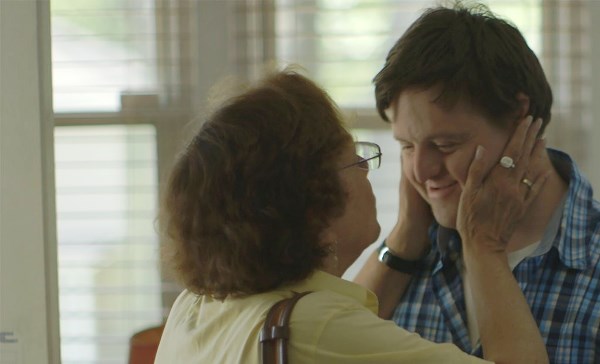This intimate documentary mostly centers on parent-child relationships in which the latter is different, often making day-to-day life challenging. It takes lots of extra effort on the parents’ part to make sure their offspring reach their full potential.
Inspired by the nonfiction book by Andrew Solomon, Far from the Tree cuts back and forth between families with a member with specialized needs. The first features Jason, who has Down syndrome, and his mother, Emily, who has devoted her life to raising him to be the most productive member of society he can be. Both she and Jason’s late father were clearly successful. At one time, their son was a celebrity advocating for greater awareness of those with Down syndrome, even appearing on Sesame Street. When the film catches up with him, he is 41 years old, works in a mail room, and lives semi-independently in a group home with other men who have the same condition.
Jack’s autism has left him highly sensitive to noise, as well as unable to control his physical behavior. Now at age 13, his family has largely adjusted to his condition, and he now attends the same school as his siblings and communicates by typing into a special tablet. The film also weaves in story lines involving persons with dwarfism, the most compelling of whom are Leah and Joe, a married couple. Along with observing Joe among his parents, the film follows his and Leah’s quest to have a child of their own.
At first glance, each segment provides a moving example of how familial love and devotion can triumph over any obstacle, but as director Rachel Dretzin doubles back to each of her subjects, a more complicated picture emerges. For example, in the case of Jason, Emily worries that he’s fallen into an all-too-comfortable rut. He has also developed an all-encompassing obsession with Queen Elsa from Frozen, whom he dresses up as and believes he visit in Norway. His mother fears this is a sign Jason cannot tell fantasy apart from reality.
Meanwhile, through home video and therapy footage, we witness just how difficult it was to communicate with Jack prior to his being correctly diagnosed. He seemingly lacked in empathy toward his increasingly exasperated parents, and even became violent toward his mother.
But the darkest moments involve Trevor. As a teenager, he committed a terrible crime for seemingly inexplicable reasons, and while Trevor is in prison now, the shockwaves from his actions continue to reverberate through those close to him. The filmmakers focus on the parents’ guilt and anger, some of it stemming from how they still have no idea what motivated their son. Could it have been a genetic or neurological defect, something they unwittingly passed down to him? The main question is whether they can still love Trevor.
Interwoven with the various chapters is Solomon himself, who takes viewers to some emotionally intense places as he discusses his own complicated relationship to his parents, which stemmed from his state of feeling “different”—his homosexuality. These interstitial scenes often resonate with what comes next. At one point, he discusses the importance of learning to love his own “brokenness,” as he deems it. The next segment then culminates in the annual Little People of America convention attended by Leah and Joe, who indeed love their respective differences.
Far from the Tree is largely inspiring, especially when Dretzin puts her subjects front and center. We see firsthand what love makes possible, whether that’s Jason’s impressive developmental strides, Jack’s budding articulateness, Joe’s educational and intellectual achievements, or his and Leah’s marriage. The film negates any argument that normality exists. The point is: we’re all somebody’s parents or children with our own respective challenges to overcome, our own triumphs to earn. The filmmakers also thoughtfully touch upon universalities about parenthood and the human condition.

















Leave A Comment